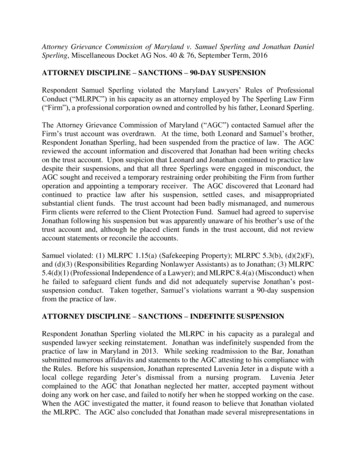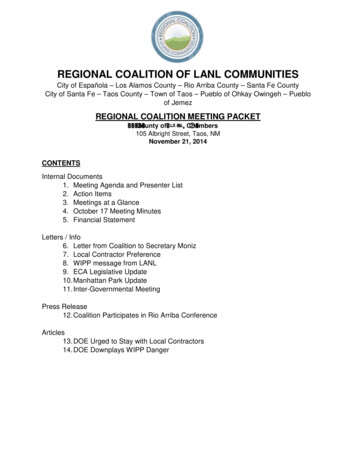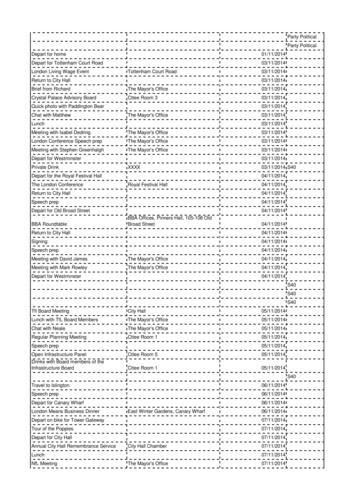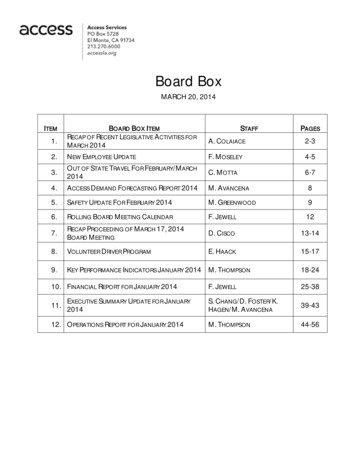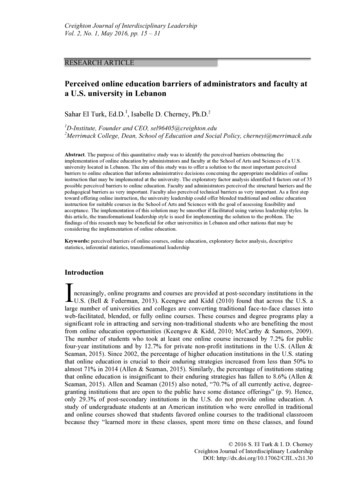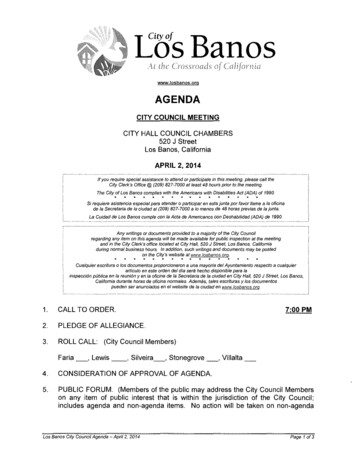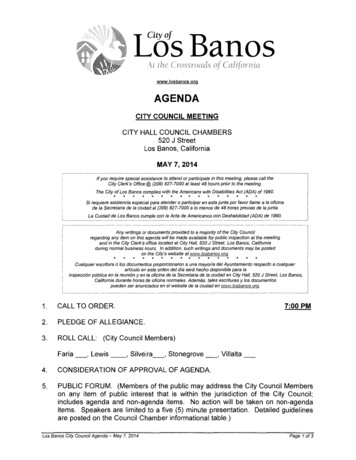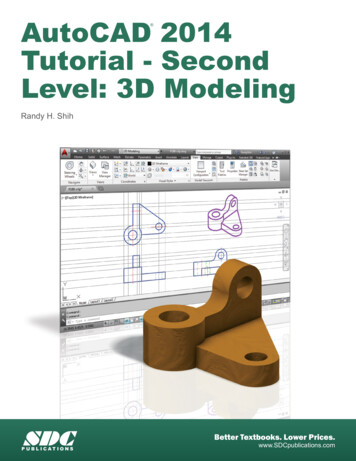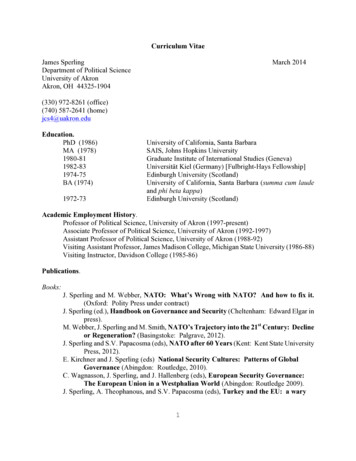
Transcription
Curriculum VitaeJames SperlingDepartment of Political ScienceUniversity of AkronAkron, OH 44325-1904March 2014(330) 972-8261 (office)(740) 587-2641 (home)jcs4@uakron.eduEducation.PhD (1986)MA (1978)1980-811982-831974-75BA (1974)1972-73University of California, Santa BarbaraSAIS, Johns Hopkins UniversityGraduate Institute of International Studies (Geneva)Universität Kiel (Germany) [Fulbright-Hays Fellowship]Edinburgh University (Scotland)University of California, Santa Barbara (summa cum laudeand phi beta kappa)Edinburgh University (Scotland)Academic Employment History.Professor of Political Science, University of Akron (1997-present)Associate Professor of Political Science, University of Akron (1992-1997)Assistant Professor of Political Science, University of Akron (1988-92)Visiting Assistant Professor, James Madison College, Michigan State University (1986-88)Visiting Instructor, Davidson College (1985-86)Publications.Books:J. Sperling and M. Webber, NATO: What’s Wrong with NATO? And how to fix it.(Oxford: Polity Press under contract)J. Sperling (ed.), Handbook on Governance and Security (Cheltenham: Edward Elgar inpress).M. Webber, J. Sperling and M. Smith, NATO’s Trajectory into the 21st Century: Declineor Regeneration? (Basingstoke: Palgrave, 2012).J. Sperling and S.V. Papacosma (eds), NATO after 60 Years (Kent: Kent State UniversityPress, 2012).E. Kirchner and J. Sperling (eds) National Security Cultures: Patterns of GlobalGovernance (Abingdon: Routledge, 2010).C. Wagnasson, J. Sperling, and J. Hallenberg (eds), European Security Governance:The European Union in a Westphalian World (Abingdon: Routledge 2009).J. Sperling, A. Theophanous, and S.V. Papacosma (eds), Turkey and the EU: a wary1
partnership (Nicosia: University of Nicosia, 2008).E. Kirchner and J. Sperling, EU Security Governance (Manchester: Manchester UniversityPress, 2007).E. Kirchner and J. Sperling (eds.), Global Security Governance (Abingdon: Routledge,2007).J. Sperling (ed.), Germany at 55: Berlin ist nicht Bonn? (Manchester: ManchesterUniversity Press, 2004)S.V. Papacosma, J. Sperling, and A. Theophanous, EU Enlargement and New SecurityChallenges in the Eastern Mediterranean (Nicosia: Intercollege Press, 2004).J. Sperling, S. Kay and S.V. Papacosma (eds), Limiting Institutions? The Challenge ofSecurity Governance in Eurasia (Manchester: Manchester University Press, 2003).J. Sperling, (ed.), Two tiers or two speeds? The European security order and theenlargement of the European Union and NATO (Manchester: ManchesterUniversity Press, 1999).J. Sperling, Y. Malik, and D. Louscher (eds), Zones of Amity, Zones of Emnity: TheProspects for Military and Economic Security in Asia, (Leiden: Brill Publishers,1998).J. Sperling and E. Kirchner, Recasting the European Order: Security Architectures andEconomic Cooperation (Manchester University Press, 1997).C. Bluth, E. Kirchner, and J. Sperling (eds.), The Future of European Security (Aldershot:Darmouth Publishing, 1994).E.J. Kirchner and J. Sperling (eds.), The Federal Republic and NATO, Forty Years After(Basingstoke: Macmilllan, 1992).Articles:‘Security Governance in Europe—A Return to System’ (coauthored), EuropeanSecurity, forthcoming 2014.‘EU police and judicial cooperation before the Treaty of Lisbon’, European Security,22:2 (2013): 202-29.‘NATO’s intervention in the Afghan civil war’ (coauthored), Civil Wars, 14:3 (2012):344-72.‘Regional Security’, Oxford On-Line Bibliographies: Political Science (Oxford:Oxford University Press, 2011).‘The European Security Order between American Hegemony and French Independence’(coauthored), European Security 20:3 (2011): 305-336.‘American Elite Perceptions of Italy as a Foreign Policy Actor: Does Italy Figure intoAmerican Foreign Policy Calculations?’, Modern Italy 15:3 (2010): 259-76.‘Germany and America in the 21st Century: Repeating the Postwar Patterns of Conflictand Cooperation’, German Politics (2010).‘Germany and European Security Governance: How Well Does the Birmingham ModelPerform?’ European Security 18:2 (2009): 125-50.‘Sharing the Burden of Collective Security in the European Union,’ InternationalOrganization (coauthored) 63:4 (2009): 789-810.‘NATO: From Kosovo to Kabul’, International Affairs (coauthored), 85:3 (2009): 4912
512.‘Is Germany a ‘Good European’? German Compliance with EU Law’ (coauthored)German Politics, 14:3 (September 2005), pp. 354-70.‘Capabilities gaps and traps: symptoms or cause of a troubled transatlantic relationship?’Contemporary Security Strategy, 25:2 (2004), pp. 452-78.‘The Foreign Policy of the Berlin Republic: The Very Model of a post-Modern MajorPower?’ German Politics, 12:3 (2004), pp. 1-34.‘The New Security Threats in Europe: Theory and Evidence,’ (coauthored) EuropeanForeign Affairs Review 7:4 (Winter 2002), pp. 423-52.‘Positive/Negative Identity in the Euro-Atlantic Communities: Germany’s Past, Europe’sFuture,’ (coauthored) Journal of European Integration, 24:4 (December 2002), pp.281-303.‘Neither Hegemony nor Dominance: Reconsidering German Power in Post Cold-WarEurope,’ British Journal of Political Science, vol. 31 (April 2001), pp. 389-425.‘Will Form Lead to Function? Institutional Enlargement and the Creation of a EuropeanSecurity and Defence Identity,’ (coauthored), Contemporary Security Studies, vol.21, no. 1 (April 2000), pp. 23-45.‘Economic Security and the Problem of Cooperation in Post-Cold War Europe, ‘(coauthored) Review of International Studies, vol. 24, no. 2 (April 1998), pp. 221237‘A Problem of Cooperation in the Asia-Pacific,’ Journal of African and Asian Studies,vol. 33, no. 1 (February 1998), pp. 1-19.‘The security architectures and institutional futures of post-1989 Europe,’ (coauthored)Journal of European Public Policy, vol. 4, no. 2 (June 1997), pp. 155-70.‘A Reconceptualization of the Arms Transfer Problem,’ (coauthored) Defense Analysis,vol. 11, no. 3 (1995), pp. 293-311.‘German Foreign Economic Policy after Unification: The End of Cheque Book'Diplomacy?,’ West European Politics, vol. 17, no. 1 (January 1994), pp. 73-97.‘(Im)migration and German Security in Post-Yalta Europe,’ German Studies Review, vol.XVII, no. 3 (October 1993), pp. 537-57.‘The Future Germany and the Future of NATO,’ (coauthored) German Politics, vol. 1, no. 1(April 1992), pp. 50-77.‘After German Unification: A Reinvigorated Atlantic Economy or the Foundation of Fortress Europe'?’ German Politics, vol. 1, no. 2 (August 1992), pp. 200-222.‘German Security Policy: A Civilian Power in an Uncivil World?’ Arms Control, vol. 12,no. 3 (December 1991), pp. 77-98.‘West German Foreign Economic Policy during the Reagan Administration: Eight Years'Hard Labor, 1981-1988,’ German Studies Review, vol. 13 (February 1990), pp. 85110.Book Chapters:‘Neoclassical Realism and Alliance Politics’ in A. Hyde-Price and M. Webber (eds),Analysing NATO: the Theory and Practice of Alliance, (Abingdon:Routledge), forthcoming.3
‘The Evolving Westphalian State and Regional Security Governance’ in J. Sperling(ed.), Handbook on Governance and Security, (Cheltenham: Edward Elgar),forthcoming.The European Union as a system of regional security governance’ in J. Sperling (ed.),Handbook on Governance and Security, (Cheltenham: Edward Elgar),forthcoming.‘Italy-US: Dependable, but not Indispensible? ISPI Commentary (21 February 2013).Publication of Istituto per gli Studi di Politica Internazionale, Milano, Italia.‘Legami atlantici’, ASPENIA, no. 61 (2013): 17-24.‘America and Europe: Stitched together but coming apart at the seams’ ASPENIA, no.57/58 (2012): 91-101.‘A Stable Crisis? NATO after Sixty Years’ in James Sperling and S. Victor Papacosma(eds.), NATO after 60 Years (Kent: Kent State University Press, 2012).‘The EU Foreign Policy and Security Identity: Waning or Waxing?’ in ISPI Studies, No.76 (November 2011).‘NATO and the Global Commons: A Perspective on Emerging Challenges’ in NATOSupreme Allied Command Transformation, Managing Change: NATO’sPartnerships and Deterrence in a Globalised World (Norfolk: ACT 2011), pp.III/3- III/16.‘Discord and Collaboration in Franco-American Relations: What can role theory tell us?’(coauthored) in Sebastian Harnisch, et al. (eds) Role Theory in ComparativePerspective (London: Palgrave, 2011).‘The European Union and NATO: subordinate partner, cooperative pillar or competingpole?’ in Spyros Blavoukos and Dimitris Bourantonis (eds) The EU Presence inInternational Organizations (Abingdon: Routledge, 2011).‘National security cultures, technologies of public goods supply and security governance’in Emil Kirchner and James Sperling (eds) National Security Cultures:Patterns of Global Governance (Abingdon: Routledge, 2010).‘The United States: full spectrum contributor to global governance?’ in Emil Kirchnerand James Sperling (eds) National Security Cultures: Patterns of GlobalGovernance (Abingdon: Routledge, 2010).‘Structure, Agency, and the barriers to Global Security Governance’ (coauthored) in EmilKirchner and James Sperling (eds) National Security Cultures: Patterns ofGlobal Governance (Abingdon: Routledge, 2010).‘Gulliver’s Travails: Recrafting a Transatlantic Bargain’ in Simon Bulmer, Charlie Jeffery,Stephen Padgett (eds), Rethinking Germany and Europe: Democracy andDiplomacy in a Semi-Sovereign State (Basingstoke: Palgrave Macmilan, 2010)‘Permanent Allies or Friends with Benefits? The Anglo-American Relationship’ in DavidBrown (ed.), British Defense Policy (Ashgate: 2010).‘The American perception of the EU: Through a Glass, Darkly or Through the LookingGlass?’ in Sonia Lucarelli and Lorenzo Fioramonti (eds), External Perceptionsof the European Union as a Global Actor (London: Routledge, 2009)‘Security Governance in a Westphalian World’ in Wagnasson, et. al (eds), EuropeanSecurity Governance: The European Union in a Westphalian World4
(London: Routledge, 2009).‘State Attributes and System Properties: Security multilateralism in Central Asia,Southeast Asia, the Atlantic and Europe,’ in Dimitris Bourantonis, Kostas Ifantis,and Panayotis Tsakonas (eds.), Multilateralism and Security Institutions in anEra of Globalization (London: Routledge, 2008).‘Turkey and the European Security Order: Boundary, Barrier or Bridge?’ in James Sperling,et. al (eds), Turkey and the EU: a wary partnership (Nicosia: University ofNicosia, 2008).‘Vertices of Conflict and Intersticies of Cooperation in the 21st century’ in Emil Kirchnerand James Sperling (eds.), Global Security Governance (London: Routledge,2007), pp. 263-86.‘The United States: the continuing search for an existential threat’ in Emil Kirchner andJames Sperling (eds.), Global Security Governance (London: Routledge, 2007), pp.161-96.‘The Evolution of NATO and the EU: What kind of future?’ in Paolo Foradori, PaoloRosa, and Riccardo Scartezzini (eds), Managing a Multilevel Foreign Policy:The EU in International Affairs (Lanham: Lexington Books, 2007), pp. 20126.‘Capabilities Traps and Gaps: symptoms or cause of a troubled transatlantic relationship?’in Martin Smith (ed.), Where is NATO Going? (London: Taylor and Francis,2006), pp.66-92.‘Berlin ist nicht Bonn?’ in James Sperling (ed.), Germany at 55: Berlin ist nicht Bonn?(Manchester: Manchester University Press, 2004), pp. 3-36.‘European Union enlargement and the future of the transatlantic alliance’ in S. VictorPapacosma, et al. (eds), EU Enlargement and New Security Challenges in theEastern Mediterranean (Nicosia: Intercollege Press, 2004), pp. 69-98‘The Challenge of Security Governance in a Changed and Changing World’ in Graham F.Walker (ed.), Independence in an Age of Empire: Assessing Unilateralism andMultilateralism (Halifax: Centre for Foreign Policy Studies, Dalhousie University,2004), pp. 302-18.‘Eurasian security governance: new threats, institutional adaptations,’ in James Sperling, et.al. (eds), Limiting Institutions? The Challenge of Security Governance inEurasia (Manchester: Manchester University Press, 2003), pp. 3-28.‘Economic Security in Post-Communist Europe,’ in Andrew Cottey and Derek Averre (eds),Securing Europe’s East: New Security Challenges in Post-Communist Europe(Manchester: Manchester University Press, 2002), pp. 141-65.‘Ideals or Self-Interest? The Indian Nuclear Deterrent and American Foreign Policy,’ inYogendra Malik, Ashok Kapur, and Hal Gold (eds), India and America:Convergent Ideals and Conflicting Strategic Interests (New Dehli: Sage, 2002),pp. 458-98.‘The enlargements of EU and NATO: constructing a two-tiered or two-speed Europeansecurity order,’ in Wolfgang-Uwe Friedrich (ed.), Germany and America: Essaysin Honor of Gerald Kleinfeld (New York and Oxford: Berghahn Publishing, 2001),pp. 247-63.5
‘EU Foreign Policy: Still an Oxymoron?’ in Stephen W. Hook (ed.), ContemporaryForeign Policy: Adaptation Strategies of Great and Emerging Powers (NewYork: Prentice Hall, 2001), pp. 118-44.‘The United States: Strategic Vision or Tactical Positioning?’ in Martin Smith and GrahamTimmins (eds), Uncertain Europe (London: Routledge, 2001), pp. 115-35.‘Enlarging the EU and NATO,’ in James Sperling (ed.), Two tiers or two speeds? TheEuropean security order and the enlargement of the European Union andNATO (Manchester: Manchester University Press, 1999), pp. 3-22.‘Two tiers or two speeds? Constructing a stable European security order,’ in James Sperling(ed.), Two Tiers or Two Speeds? The European security order and theenlargement of the European Union and NATO (Manchester: ManchesterUniversity Press, 1999), pp. 181-199.‘Less than meets the eye: German structural dominance in Europe,’ in Mary Hampton andChristian Søe (ed.), Between Bonn and Berlin: German Politics Adrift (Totowa:Roman and Littlefield, 1999), pp. 257-76.‘The German Pursuit of Economic Security, 1949-1999,’ in Peter Merkl (ed.), The FederalRepublic of Germany at 50 (New York: St. Martin’s Press, 1999), pp. 275-86.‘The Economic Elements of the European Security Order,’ in Carl C. Hodge (ed.),Redefining Security: National, Transnational, and Institutional Change at theEnd of the Century (New York: Garland Press, 1999), pp. 51-72.‘The Problem of Debt Finance in Central Europe and its Implications for European Security:The Case of Poland,’ in Emil J. Kirchner (ed.), Transition and Regional Stability:the Case of the Visegrad Countries (Basingstoke: Macmillan, 1999), pp. 191-207.‘The German Architecture for Europe: Military, Political and Economic Dimensions,’ inPeter Merkl, (ed.), The Federal Republic of Germany at Forty-Five: Unionwithout Unity (New York: NYU Press, 1995), pp. 359-77.‘Burdensharing revisited,’ in Christoph Bluth, Emil Kirchner, and James Sperling (eds.),The Future of European Security (Aldershot: Dartmouth Publishers, 1994), pp.163-186.‘Germany Security Policy in Post-Yalta Europe,’ in Donald Hancock and Helga Welsh(eds.), German Unification: Process and Outcomes (Boulder: Westview Press,1994), pp. 261-84.‘Arms Transfers and the Structure of International Power’ (coauthored) in Norman Graham,(ed.), Seeking Security and Development: The Impact of Military Spending andArms Transfers (Boulder: Lynne Reiner, 1994), pp. 55-77.‘Implications of German Unification for European Security,’ in Michael Huelshoff, AndreiMarkovits, and Simon Riech (eds.), The New Germany in the New Europe (AnnArbor: University of Michigan Press, 1993), pp. 321-46.‘Unified Germany, a Single European Area, and the Future of the Atlantic Economy’ in CarlLankowski (ed.), Germany and the European Community: Beyond Hegemonyand Containment? (New York: St. Martin's Press, 1993), pp. 179-217.‘No Sticks? No Carrots? The Course of German Foreign Economic Policy afterUnification,’ in Nick Meyerhoffer (ed.), Germany and the United States Facingthe Post-Communist World (Phoenix: Northern Arizona University, 1993), pp. 156
36.‘From Instability to Stability’ (coauthored ) in Emil J. Kirchner and James Sperling (eds.),The Federal Republic of Germany and NATO, Forty Years After (London:Macmillan, 1992), pp. 1-28.‘From Certainty to Uncertainty’ (coauthored) in Emil J. Kirchner and James Sperling (eds.),The Federal Republic of Germany and NATO, Forty Years After (London:Macmillan, 1992), pp. 252-66.‘NATO, the United States, and West German Foreign Economic Policies, 1949-1989’ inEmil J. Kirchner and James Sperling (eds.), The Federal Republic of Germany andNATO, Forty Years After (London: Macmillan, 1992), pp. 157-194.‘The Federal Republic, the United States, and the Atlantic Economy, 1949-1989,’ in PeterMerkl (ed.), The Federal Republic at Forty (New York: New York UniversityPress, 1989), pp. 367-390.Select non-refereed publications‘The Post-Westphalian State, National Security Cultures, and Global SecurityGovernance’, EU-GRASP Working Paper N 15 (August 2010).‘NATO AND AFGHANISTAN: DÉJÀ VU ALL OVER AGAIN?’, In Depth 6:2(March-April 2009), Cyprus Centre for European and International Affairs,University of Nicosia.‘Regional or Global Security Cooperation? The Vertices of Conflict and Interstices ofCooperation,’ Discussion Paper TAP/2007-8/2, Robert Schuman Centre forAdvanced Studies, European University Institute, March 2008.E. Kirchner and J. Sperling (eds), Global Threat Perceptions: Elite Survey resultsfrom Canada, China, the European Union, France, Germany, Italy, Japan,Russia, and the United States, GARNET Series E-book, Working Paper No.18/07 (May 2007).Conference Papers.Invited (2000-2013):‘America in the Middle: Defending or Dominating the Geostrategic and GeoeconomicSystems of Governance?’ prepared for the seminar ‘Global Governance: CrossedPerspectives’ 22 October 2013, Rio de Janeiro, Brazil. Sponsored by theAlexandre de Gusmão Foundation and the Istituto per gli Studi di PoliticaInternazionale.‘Taken for granted or not taken seriously? American Elite Perceptions of Italy as aForeign Policy Actor’, Research Seminar presentation, Istituto per gli Studi diPolitica Internazionale Palazzo Clerici (Via Clerici 5 - 20121 Milano), 15February 2012.‘NATO and the Global Commons: Norfolk, We have a problem’, NATO SupremeAllied Command Transformation, Managing Change: NATO’s Partnerships andDeterrence in a Globalised World, Villa Guastavillani, Bologna, Italy. Hosted byACT and Istituto Affari Internazionali, 21-22 June 2011.‘Reconciling Sovereignty and Solidarity in Crisis Management’, presented at Search for7
Solidarity: Developing EU capacities for crisis and disaster management,Résidence Palace, Brussels, Belgium. Sponsored by European Policy Centre,Swedish Civil Contingencies Agency, King Baudouin Foundation and Compagniadi San Paolo, 24 March 2011.‘Beyond Globalisation: Reflections on International Security Issues in the Coming Decade,’ AGlobal Crisis or a Crisis for Globalization? The Challenges for Europe, SNES SpringConference 2010, Karlstad University, Karlstad, Sweden, 18-19 March 2010.‘Neoliberal Institutionalism and NATO: What can Theory Tell us?’ ECPR Workshop II,Theorizing NATO, Royal Netherlands Military Academy, Breda, the Netherlands,24-25 February 2010.‘Burden-sharing in NATO: The Case of Afghanistan,’ delivered at the University ofMontreal, Montreal, Canada, February 2010.‘National security cultures, technologies of public goods supply and security governance,’4th Annual GARNET Conference (funded by Framework 6 Program, EuropeanUnion), Rome, Italy, September 2009.“What does Theory Tell Us about the Impact of Enlargement on NATO?”, ECPRWorkshop Theorizing NATO (conveners: Mark Webber and Adrian Hyde-Price)Lisbon, Portugal, 15-19 April 2009.“Neutrality in the (Post)-Westphalian State System” paper presented at Neutrality andEuropean Security Governance During and After the Cold War, University ofNicosia, Nicosia, Cyprus, 6-7 April 2009.“Policies of Protection: Impure Public Good and the Problem of Collective ActionProblem?”, paper prepared for Swedish Civil Contingencies Agency conference,Crisis Management in Europe: What role for the EU and the Swedish Presidency2009?, Swedish National Defense College, Stockholm, Sweden, 28 January 2009“NATO: Necessary but Insufficient?”, paper prepared for Saint Malo 10: Is the ESDPCapable and Credible, Queen’s University, Kingston, Canada, 4-6 December 2008“Mars & Venus or Shiva & Vishnu: Transatlantic Roles after 9/11”, paper prepared forworkshop sponsored by the Thyssen Foundation, Role Theory Research inInternational Relations: Conceptual Challenges and Political Promise, Trier,Germany, 30 September-1 October 2008.“National Security Cultures, the Technology of Public Goods Production and RegionalSecurity Governance” paper prepared for the GARNET workshop, SuffolkUniversity, Boston, MA, 18-19 April 2008.“The External Image of the European Union: United States”, paper prepared for GARNETworkshop on The external image of the EU, held at the Forum on the Problems ofPeace and War, University of Florence, Villa Bandini, 14-15 March 2008.“Regional and Global Security Governance: Vertices of Conflict, Interstices of Cooperation”,paper presented at the European University Institute, Transatlantic Programme 2007-8Lecture Series, Florence, Italy, 13 March 2008.“Regional or Global Security Cooperation?”, seminar presentation, Dipartimento di Politica,Istituzioni, Storia, University of Bologna, Bologna, Italy, 12 March 2008.“Germany and the Governance of European Security: Laggard or Leader?” paper presented atthe School for Advanced International Studies, the Johns Hopkins University--8
Bologna Center, 12 March 2008.‘Security Governance’, paper prepared for workshop on Security Governance Meets GreatPower Gambit: Clashes and Prospects, sponsored by the Swedish NationalDefence College, 25-26 October 2007.‘The “Birmingham School” on Germany and Europe”, paper delivered at Germany and thefuture of Europe: the Constitutional Debate and the German Presidency”,sponsored by the Friedrich Ebert Stiftung, UACES, and the Edinburgh EuropaInstitute, University, 28 February – 1 March 2007“Analyzing Atlantic and European Security Institutions”, paper delivered at the EuropeanSecurity Conference Innsbruck 2006, University of Innsbruck, Austria, 29September – 1 October, 2006.“Principled barriers to the EU as a security actor: the contra-imperatives of sovereigntyand solidarity’, paper delivered at Future Challenges of Crisis Management inEurope, sponsored by the Swedish Emergency Management Agency, Stockholm,3-5 May 2006“The American Perception of Threat”, paper delivered at the GARNET workshop on globalgovernance, sponsored by the European Commission, 6th Framework Programme,Mallorca, Spain, 4-6 September 2006.“Regional Conflict and Cooperation: the evidence so far”, paper delivered at the GARNETworkshop on global governance, sponsored by the European Commission, 6thFramework Programme, Mallorca, Spain, 4-6 September 2006.“US Threat perception: From the communist to the radical islamist threat”, paper deliveredat the University of Trento, Trento, Italy, Workshop on global governance,sponsored by the European Commission, 6th Framework Programme, 22-25September 2005“State Attributes, System Properties and Varieties of Security Multilateralism”, paperdelivered at Athens University School of Economics and Business, Delphi, Greece,3-5 June 2005“Boundary, Barrier, Bridge: Turkey’s roles in the European security order”, paperdelivered at Intercollege, Nicosia, Cyprus, 12-14 May 2005“How badly damaged is the transatlantic alliance? A skeptical view,” roundtablepresentation at the Association for the Study of German Politics, Oxford University,15-16 April 2004.“The Challenge of Security Governance in a Changed and Changing International System,”paper presented at Conference on Regional Integration and Public Goods, UnitedNations University, Bruges, Belgium, 20-21 November 2003.“EU Enlargement and the future of the Transatlantic Alliance,” paper presented at EvolvingRelationships: Regional Security in the Eastern Mediterranean, Intercollege, Nicosia,Cyprus, May 2003.“Security Governance in the 21st Century: Problems and Prospects,” paper prepared forworkshop on Global Governance held at IGCC, UC San Diego, La Jolla, CA, 2October 2002.“The New Security Threats to Eurasia: Theory and Evidence” for conference Central AsianSecurity held at Renmin University, Beijing, China, 24-26 April 2002.9
“The new security agenda and the enlargements of NATO and the EU: Four scenarios for thefuture” presented at IGCC, UC San Diego, La Jolla, California, 16 March 2002.“Germany and the Enlargements of NATO and the EU: Four Scenarios for the Future,” forworkshop Germany after Enlargement, held at the Paul Nitze School of AdvancedInternational Studies, the Johns Hopkins University, Washington, DC, 16 November2001.“The New Security Agenda, International Institutions, and the Challenge of EurasianSecurity,” Lemnizter Center for NATO and EU Studies, Kent State University, 28-30September 2001.“The (not-so-new) Focus on Economic Security,” Croft Institute, University of Mississippi,Oxford, Mississippi, September 2000.Scholarly Meetings (2000-2013)‘The Libyan Abstention: Is Germany a (neoclassical) Realist Power?’ delievered at theannual meeting of the American Political Science Association, 29 August-1 September2013.‘Gulliver’s Travail: Crafting a New Transatlantic Bargain’, delivered at 17th Conference ofEuropeanists, 15-17 April 2010, Montreal, Canada.‘Security Governance and the Emergence of the Late- ‐ and Post- ‐Westphalian State’, paperdelivered at the annual meeting of the International Studies Association, 15-18February 2009, New York, New York.‘EU Security Governance: From Deterrence to Joint Production of Security’, paperdelivered at the annual meeting of the International Studies Association, 15-18February 2009, New York, New York.‘Gulliver’s Travails: Recrafting a Transatlantic Bargain’, paper delivered at the annualmeeting of the American Political Science Association, Boston, MA, 28-31 August2008.‘On the (relative) Unimportance of Germany: Changing power relationships in theTransatlantic Alliance’, 31st Annual Meeting of the German Studies Association,San Diego, California, 4-6 October 2007.‘US Perceptions of the European Union’, 4th ECPR General Conference, Pisa, Italy, 6-8September, 2007“Security Multilateralism in Europe: What role for Germany?”, paper delivered at theannual meeting of the American Political Science Association, Philadelphia, PA, 31August - 3 September 2006.“Germany’s future role in NATO and the ESDP” German Studies Association Meeting,Washington, DC, 5-7 October 2004.“The New Security Agenda and the Challenge of Global Security Governance: A ConceptualAnalysis”, paper delivered at the meeting of the SGIR, The Hague, 10-12 September2004“American Security Policy and Global Governance, 1989-2002", paper delivered at themeeting of the SGIR, the Hague, 10-12 September 2004.“Capability Gaps and Capability Traps: The ‘newest’ problem in Atlantic Relations,” paperpresented at the British International Studies Association, University of Birmingham,10
England, 15-16 December 2003.“The Foreign Policy of the Berlin Republic: The Very Model of a post-Modern Major Power?”paper presented at the annual meeting of the German Studies Association, 26-28September 2003.“The New Security Threats in Europe: Theory and Evidence,” paper presented at the biennialmeeting of the European Union Studies Association, Nashville, TN, 27-29 March 2003.“How ‘Normal’ is German Foreign Policy?” paper presented at meeting of the German StudiesAssociation, San Diego, CA, 3-6 October 2002.“Compliance with EU Law: Is Germany a Better European?” paper prepared for theInternational Studies Association Meeting, New Orleans, LA, 28-31 March 2000.“Positive and Negative Identities in the Shaping of a New German Security Policy,”(coauthored) German Studies Association Meeting, Washington, DC, 4-7 October2001.“Neither Dominance nor Hegemony: Reconsidering German Power in Post-Cold War Europe,”Annual Meeting of the American Political Science Association, Washington, DC,September 2000.“Negative Identity Formation and German Foreign Policy,” Annual Meeting of the GermanStudies Association, October 2000.11
James Sperling March 2014 Department of Political Science University of Akron Akron, OH 44325-1904 (330) 972-8261 (office) (740) 587-2641 (home) jcs4@uakron.edu Education. PhD (1986) University of California, Santa Barbara . German Compliance with EU Law' (coauthored) German Politics, 14:3 (September 2005), pp. 354-70.

